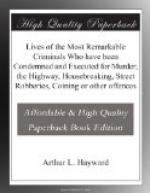The method they took here for that purpose was by altering bank-notes, which they did so dexterously as absolutely to prevent all suspicion. They succeeded in paying away two of them, but the fraud being discovered by the cheque-book at the bank, Schmidt was apprehended and brought to a trial. There it was sworn that being in possession of a bank-note of L25 he had turned it into one of L85, and with the Baron Vanloden tendered it to one Monsieur Mallorey, who gave him goods for it, and another note of L20. It was deposed by the Baron Vanloden and Eleanora Sophia, Countess Vanloden, that Schmidt took the last mentioned note of L20 upstairs, and soon after brought it down again, the word “twenty” being taken out; upon which they drew it through a plate of gummed water, and then smoothing it between several papers with a box iron, the words “one hundred” were written in its place. Then he gave it to the Baron and the interpreter to go out with it and buy plate, which they did to the amount of L40. It appeared also, by the same witnesses, that Schmidt had owned to the Baron that he could write twenty hands, and that if he had but three or four hundred pounds, he could swell them to fifty thousand. It was proved also by his own confession that he had written over to his correspondent in Holland, to know whether English bank-notes went currently there or not. Upon which he was found guilty by a party-jury, that singular favour permitted to foreigners by the equitable leniency of the Law of England. Yet after this he could hardly be persuaded that his life was in any danger; nay, when he came into the condemned hold, he told the unhappy persons there, in as good English as he could speak, that he should not be hanged with them.
For the first two or three days, therefore, that he was under sentence, he refused to look so much as on a book, or to say a prayer, employing that time with unwearied diligence in writing a multitude of letters to merchants, foreign ministers, and German men of quality and such like, still holding fast his old opinion that his life was not in the least danger; and when a Lutheran minister was so kind as to visit him, he would hardly condescend to speak with him. But when he had received a letter from him who had all along buoyed him up with hopes of safety, in which he informed him that all those hopes were vain, he then began to apply himself with a real concern to the Lutheran minister whom he had before almost rejected, but did not appear terrified or much affrighted thereat. However, quickly after, he fell into a fit of sickness and became so very weak as not to be able to stand. He confessed, however, to the foreign divine who attended him that he was really guilty of that crime for which he was to die, though it did not appear that he conceived it to be capital at the time he did it, nor, indeed, was he easily convinced it was so, until within a few days of his execution.




